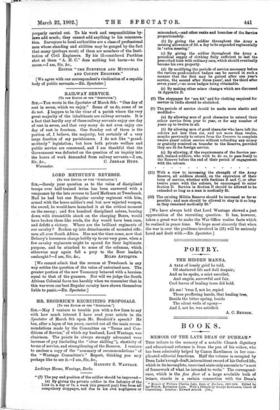MR. BRODRICS'S RECRUITING PROPOSALS.
[To THE EDITOR OP THE "SFECTATOR.1 SIR,—May I venture to trouble you with a few lines to say with how much interest I have read your article in the Spectator of March 8th upon Mr. Brodrick's speech ? He has, after a lapse of ten years, carried out all the main recom- mendations made by the Committee on " Terms and Con- ditions of Service," of which my husband, Lord Wantage, was chairman. The points he always strongly advocated were increase of pay (including the " clear shilling "), elasticity of terms of service, and strengthening of the Reserve. I venture to enclose a copy of the "summary of recommendations" of the "Wantage Committee's " Report, thinking you mry perhaps like to see it.—I am, Sir, &c., HARRIET S. WANTAGE.
Lockinge House, Wantage, Berks.
" (7) The pay and position of the soldier should be improved—
(a) By giving the private Eoldier in the Infantry of the Line Is. a day or 7s. a week (his present pay) free from all compulsory stoppages, not due to his own negligence or misconduct, —and other ranks and branches of the Service proportionately.
(b) By giving the soldier throughout the Army a messing allowance of 3d. a day to be expended regimentally in extra messing.
(c) By giving the soldier throughout the Army a periodical supply of clothing fully sufficient to last the prescribed time with ordinary care, which should eventually become his own property.
(d) By modifying the periods of service necessary before the various good-conduct badges can be earned in such a manner that the first may be gained after one year's service, the second after three years', and the third after seven years',—no more badges being obtainable.
(e) By making other minor changes which are discussed in Appendix B.
The stoppages for 'sea kit' and for clothing required for service in India should be abolished.
The periods of service should be made more elastic and modified— (a) By allowing men of good character to extend their colour service from year to year, or for any number of years up to twelve in all.
(b) By allowing men of good character who have left the colours not less than six, and not more than twelve, months previously to return from the Reserve to complete twelve years' colour service without refunding any money or gratuity received on transfer to the Reserve, provided they are fit for foreign service.
(c) By allowing, if the requirements of the Service per- mit, trained soldiers, who wish to do so, to pass freely to the Reserve before the end of their period of engagement with the colours.
(21) With a view to increasing the strength of the Army Reserve, all soldiers should, on the expiration of their term of service, whether with Sections B and C, or after twelve years with the colours, be encouraged to enter Section D. Service in Section D should be allowed to be extended so long as a man is medically fit.
(22) The existing Militia Reserve should be increased as far as possible; and men should be allowed to stay in it so long as they remained medically fit."
[We have always held that Lord Wantage showed a just appreciation of the recruiting question. It has, however, taken a great war to make the War Office realise facts which be realised in peace time. We hope most sincerely that when the war is over the problems involved in (21) will be seriously faced and dealt with.—ED. Spectator.]










































 Previous page
Previous page